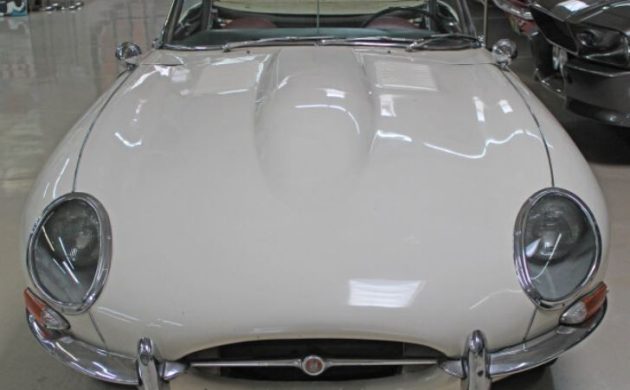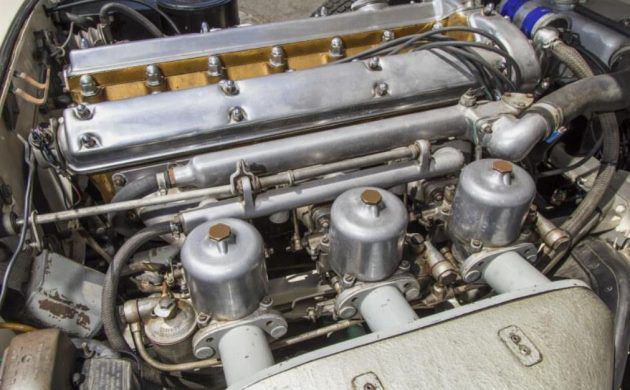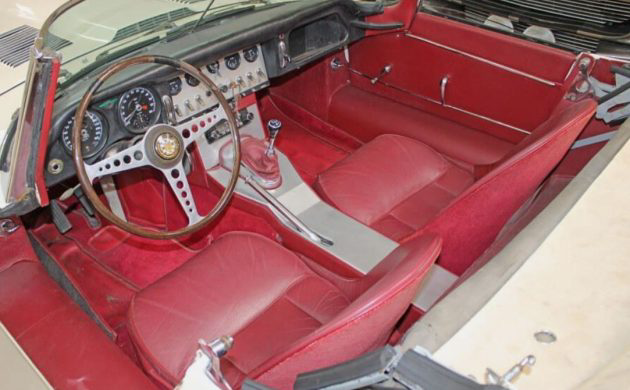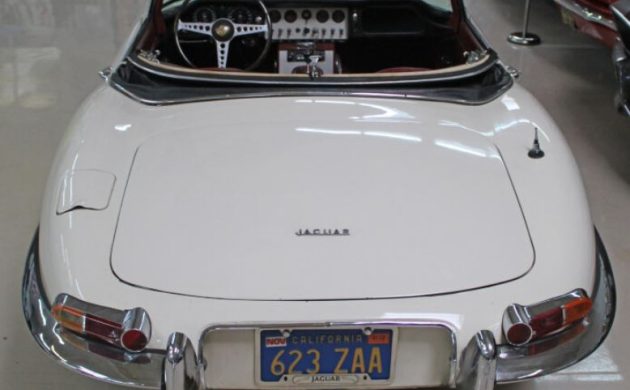
The market has sorted the XKE into what I call a “desirability stack”. At the pinnacle are the rarified – a couple of handfuls of Lightweights (the racing version), a few hundred “outside bonnet latch” (aka OBL) cars, and the two thousand “flat floor” cars. All these can command market price premiums. Once we dispense with the fantasy cars, we are reduced to simply early vs late, coupe vs convertible, and whether or not one should even bother with a 2+2. Here on eBay is an example with at least two desirable features: a 1962 Jaguar XKE flat floor roadster, bid to $40,100, reserve not met. It’s not difficult to find a clue to the reserve in this case: here is the car on the dealer’s website, with an asking price of $138,500 – still a reasonable price for an early flat floor roadster, if you can believe it. That’s likely because the car may have had a color change, as well as a few mechanical upgrades. Today’s market assigns demerits for non-factory elements, unfortunately. For the undeterred, this car can be retrieved from San Diego, California.

The engine bay is a thing of beauty: dual overhead camshafts under those simple cam covers, the three fat-potted SU carburetors, gleaming linkages. No, the underhood real estate is not in show condition, but a buyer should welcome the opportunity to improve it and add value. Meanwhile, the 3.8-liter six generates 265 hp and a top speed of 150 mph; later XKEs received a 4.2-liter version with the same power output but better torque. The four-speed gearbox has synchros on second through fourth; by mid ’64 the gearbox was all-synchro. XKEs always had disc brakes and independent suspension all around. The car is available out of long-term ownership during which only 2500 miles accumulated. The listing alludes to upgrades performed to the fuel and cooling systems to make the car more user-friendly. It’s offered in fully-serviced and running condition with a fat file of receipts along with a Jaguar Heritage Trust certificate.

The interior shows some signs of age, including fading and wear on the leather upholstery, but every element of the early Jag is present – the beautiful gauges, the patterned aluminum console, toggle switches, the slender seats. The trunk is tidy, and under that carpet and the board below it will be the spare.

According to the seller, the car was delivered in Old English White – a cream color – with a red interior and black convertible top. At some point, the car was repainted white, but the listing refers to a “bright white” – so it’s unclear if this XKE is still cloaked in its original color. Nonetheless, the forty photos on the dealer’s website establish the car’s fine condition – not perfect, but certainly good enough for most garages. What about yours?





When I saw this and read about the color, the first thing I thought of was the Jag the Dave Clark Five had. This really is one sweet looking E Type.
Michelle, you’ve done it again – twice! You (thankfully) didn´t mention Enzo Ferrari and you gushed: “The engine bay is a thing of beauty.” You’re so right!
Thank you so much – when I first started to write for BF, I said something about the TR motor being a “tractor motor”, not exactly that but close, and a commenter said “quit with the tired clichés”. That stung but y’know, he was right.
I’m not so into E-Types that I would know about “flat-floor” cars or the minutiae of bonnet latch placements, but an early drop-top is definitely something I’d love to be able to own.
My guess is that’s original color (if not the exact shade), as the front chassis rails would have had to be repainted to match the body. That’s something I learned from another BF commenter, BTW. It pays to ask!
And, finally, that blue CA license plate doesn’t indicate all that much age. I had a new car in 1976 that had “SAR” as its letters. So the plates are likely a few years newer.
But who cares? I want it! (my birthday’s coming up soon if any of you are interested in getting me something nice….)
Flat Floor XKEs are not for the faint of heart. The market cruelly punishes those which are not correct to the minutest detail. It can easily take 5 years to source all the correct parts, and time is now your enemy in your search. Meanwhile, it’s still too valuable to take on weekend jaunts and park at the hotel in the condition it currently sits.
To give you an example, many years ago I purchased a beautiful ( much better condition than this) XK150S OTS. By the time I corrected all the ” littke stuff” to bring it up to high concours condition, I was into it for another $20K on top of $100 K initial purchase price.
It might easily take $100K + years to bring this one up to concours.
Who wants a concours car? Not me
My 1962 OTS is chassis 876993. It does NOT have flat floors. This 1962 is chassis 877215. It is 222 cars beyond mine. There is NO way it was delivered from the factory with flat floors! My buddy has 877196. His, likewise, does NOT have flat floors! Something is wrong!
Always love XKEs. One of my favorite aspects however (Don’t laugh) – are the toggle switches. They just look like they mean business. I don’t even care what their function is.
Yes! Toggle switches are the best. Rockers look clunky and fat, toggles are smart and slender, kinda like the rest of this early Jag.
And the British “Health and Safety” brigade had them banned because they claimed that a person could get injured by them in the case of an accident! If you were in an E Type Jag you would most likely be doing 100 mph so toggle switch injuries would be the least of your problems!
There was a young lawyer in my town back then who bought a new 65 in Primrose Yellow with black interior and top and wires. It stood out in our town of 7000 people and he drove it for real in winter and salt. In late 69 he traded it for a Corvette and a buddy of mine got a loan and bought the Jag with maybe 40k miles… for maybe 3700 bux.
One Saturday morning we took it for a drive and he let me drive it…. we went out to a newly built freeway and he told me to shift into third and floor it coming down a tall overpass…. in 4h gear I saw the tach needle well into the orange…. the top was a bubble…. the car was very stable but had very quick steering…
Not the first time he and I did crazy stuff…. in early 69 he had a 65 Buick Electra convertible and his dad had a new Buick Wildcat….. I drove his car and we took them to a country road and raced them…. side by side with the speedometer buried….. we then turned around and put the cars away and had a beer…… Another time I was in the back seat with a camera and got a picture of the speedometer buried… it was difficult to not bump him as the big Buick floated over undulations in the road surface at 120 plus….
You were a bad bad boy.
Jaguar continued to improve the Ser I E-type through ’67. Get rid of the cumbersome outside bonnet latches, then the uncomfortable flat floors, then the awful non-synchro Moss box, then the uncomfortable seats and less torquey 3.8 … yet the early cars are “more desirable.” Worth more? Yes. More desirable? Not if you drive them.
Beautiful E-Type on BaT just sold for 272.5K
We’re quickly moving into some rarefied air for some of these…..
I had a 62 flat floor E-Type roadster it was beautiful to look at but not a lot of fun to drive around town and love the highway however
Why is it called “flat floor”?
I’m not trying to be a jerk, but it’s because the floors are flat. Later cars had about a 2.5-3″ drop in the revised floor pans for both driver and passenger.
My first Jaguar was an early 64 coupe out of a deceased junk yard owner’s personal stash of buildable cars. Bought it and a 67 2+2 manual for $3500. The coupe was 3 different shades of yellow and a ratty interior, but ran like nothing I had ever owned. Learned to double clutch on the Moss box. Buried the Speedo once in the early morning hours racing a 240Z. An exhaust valve froze the following week. Wonderful memories with the car.
This example is the wrong color; the only white available was Old English White, an Ivory tint. The BIN is a correct value nonetheless .
The early 1961 E-Types had no heel cavity (flat floor) as well as welded louver inserts in the hood and a non-scaloped bulkhead behind the seats. There were a few cars prior to this group that had external bonnet (hood) latches before the dual internal releases were empliyed.
Whoa! New (to me) nomenclature.
Is the flat floor level with the door sill?
And if the floor is lower than the door sill that drop makes the heel cavity?
Please opine.
Lcl
I don’t think that the original floor level was changed, but what they did was to lower the floor under the pedals so that the drivers heel was lower. That meant that the floor under the seat was flat and then it sloped down to the firewall.
English roadsters, leather seats, wire wheels, and toggle switches; the stuff that dreams are made of.
My dad owned a 1964E type coupe, it was lovely, I can still remember the smell of leather inside. He crashed into a tree, one night going way too fast. Ironically, before he totaled the jaguar, he didn’t spend a lot of time driving it, as it was always in the shop for one thing or another. Guess that’s the price you pay for owning a jag.
I have a factory wire wheel wrench if someone is interested.
[email protected]
This is the Holy Grail of production (Non-Racing) E-Types, even though later Series 1’s were more refined.
Even with non-original paint, it will still bring nice money. It’s a beauty, even with its imperfections.